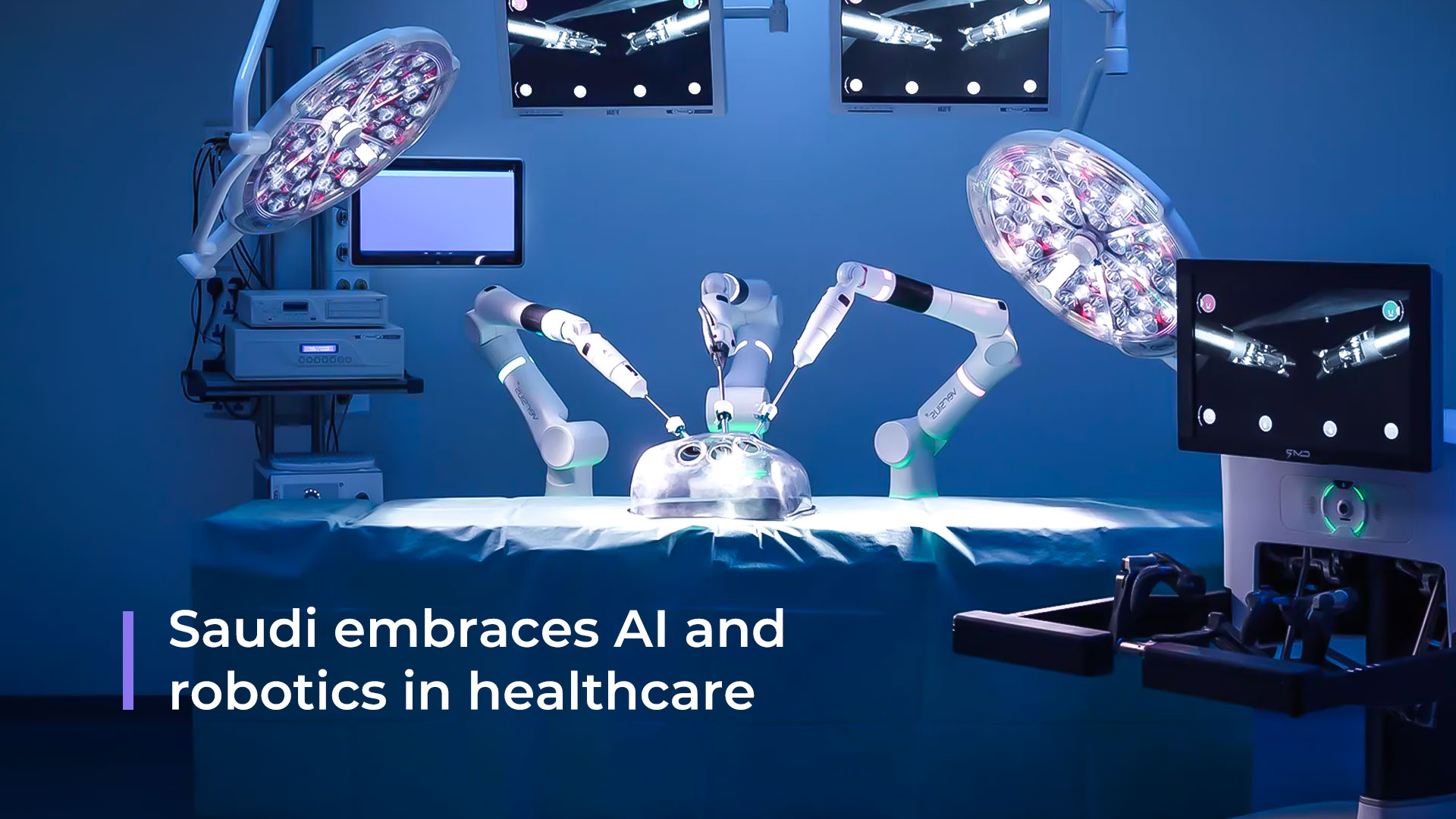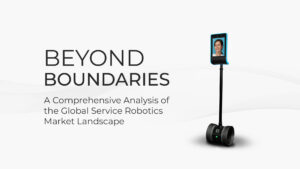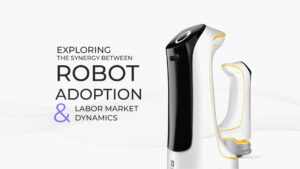Introduction
Saudi Arabia is making significant strides in embracing artificial intelligence (AI) and robotics in its healthcare sector. With its Vision 2030 plan to diversify the country’s economy, robotics and AI have emerged as the key technologies to enhance healthcare services, improve patient outcomes, and promote innovation. This article will highlight how Saudi embraces AI and robotics in healthcare, key drivers, applications, and future opportunities of these two groundbreaking technologies in the healthcare sector. Let’s jump in.
Table of Contents
Saudi embraces AI and robotics in healthcare
Embracing the transformative power of robotics and AI in healthcare is undeniably daunting, yet the potential benefits for healthcare recipients and providers are immense. In our rapidly evolving world, these advanced technologies are increasingly ingrained in the fabric of our healthcare ecosystem. According to a 2017 PwC study, most consumers are willing to receive care from these cutting-edge technologies, recognizing their capacity to revolutionize healthcare delivery, making it more efficient, prompt, and accessible to all.
As the Saudi Government takes proactive measures to bolster employment opportunities for its citizens, the looming impact of robotics and AI in the job market cannot be ignored. While technological advancements traditionally enhance productivity and create new job prospects, the Kingdom has a unique opportunity to position itself as a global hub for AI and robotics, thereby generating employment. There is a firm belief that the Middle East, particularly Saudi Arabia, has the potential to leapfrog ahead of other nations in these groundbreaking technologies.
When contemplating the future of robotics and AI, many need help to understand the vast possibilities and opportunities that artificial intelligence brings to our world. As AI becomes integral to everyday life, previously inaccessible services will become universally available. Experts in the field assert that the nation can ascend to global leadership in this technology by embracing AI and robotics in the Saudi healthcare sector. This not only addresses gaps in healthcare provision that may be challenging to fill with traditional workforce solutions but also stands as a testament to the inherent superiority of these advanced technologies.
The drive for AI and robotics initiatives
The need for digitization initiatives in Saudi Arabia’s healthcare system arises from various factors. The growing population, increased life expectancy, and prevalence of chronic diseases have put pressure on healthcare resources. To address these challenges, the government is leveraging AI and robotics to streamline processes, optimize resource allocation, and improve patient care outcomes.
Additionally, the COVID-19 pandemic has further accelerated the digitization of healthcare in Saudi Arabia. The introduction of telemedicine services, AI-powered diagnostics, and robotic assistance in hospitals has helped manage the crisis more effectively while minimizing the risk of transmission. Some key findings emerged in a 2017 survey by PWC conducted on the urban representatives of Saudi Arabia and the Middle East.
Key findings
The findings revealed three key themes:
- People are growing willing to interact with AI and robots, driven by the prospect of enhanced access to healthcare.
- The swiftness and precision of diagnosis and treatment emerge as pivotal factors influencing this willingness.
- Trust in technology plays a crucial role in fostering broader acceptance and adoption; the human element remains integral to the healthcare experience.
The survey delved into the respondents’ attitudes towards AI and robotic involvement in healthcare, even in the operating room. A noteworthy percentage, ranging from nearly half to as high as 73%, expressed a willingness to allow a robot to perform minor surgical procedures instead of a human doctor. In the Middle East, this openness varied from 50% in the UAE to 55% in Saudi Arabia and Qatar.
Reasons behind willingness and unwillingness
The research also explored the primary drivers influencing individuals’ willingness or unwillingness to embrace AI-enabled or robotic healthcare procedures or services. The predominant motivations for acceptance were the desire for easier and quicker access to healthcare services (36%) and the need for speedy and accurate diagnoses (33%). Conversely, distrust in robots’ decision-making capabilities (47%) and a perceived absence of the human touch (41%) were identified as the primary reasons for reluctance. While the percentages varied among countries, these top two advantages and disadvantages were consistently ranked in the same order across all nations, except for Saudi Arabia and Qatar, where respondents highlighted the lack of human touch as the most significant disadvantage.
Impact on healthcare innovation in Saudi Arabia
The digitization of healthcare in Saudi Arabia will profoundly impact innovation. AI-powered technologies enable accurate diagnosis, early detection of diseases, and personalized treatment plans. Making proactive healthcare interventions using machine learning algorithms is possible by analyzing vast amounts of patient data and identifying patterns.
Integrating robots into healthcare settings can automate mundane and repetitive tasks, allowing healthcare professionals to prioritize more complex patient care activities. Robotic-assisted surgeries, for example, provide greater precision, shorter recovery times, and fewer complications.
Robotics and AI in medical laboratories
AI is revolutionizing global healthcare and is poised to transform laboratory medicine. Its applications in streamlining processes, aiding diagnoses, and enhancing result interpretation bring precision and efficiency to analytical workflows. As machine learning evolves, personalized precision medicine becomes more widespread, with AI facilitating the identification of tailored drug treatments. In parallel, robotics rapidly integrates into medical laboratories, supporting complex surgeries and sample processing tasks. The synergy of robotics and AI boosts efficiency, quality, and precision in laboratory processes, improving overall quality of life and reducing the risk of life-threatening illnesses.
Opportunities for AI and robotics in Saudi Arabia’s healthcare development
Beyond the immediate impact on healthcare innovation, AI presents numerous opportunities for further growth in the Saudi Arabian healthcare sector. These include:
Data-driven decision-making:
AI enables healthcare providers to leverage large datasets to make informed decisions and develop evidence-based policies.
Enhanced patient experience:
AI-powered chatbots and virtual assistants can provide round-the-clock support, answer patient queries, and offer personalized healthcare information.
Improved resource allocation:
AI algorithms can optimize resource allocation, ensuring healthcare facilities operate efficiently and effectively.
Predictive analytics:
AI can help predict disease outbreaks, optimize preventive measures, and allocate resources in real time, thereby enhancing public health.
The role of artificial intelligence and robotics in Saudi Arabia’s Vision 2030
As part of its Vision 2030 plan, The Kingdom has identified digital transformation and innovation as essential pillars for economic growth. Artificial intelligence forms a crucial component of this plan, with the government recognizing its potential to revolutionize the healthcare sector. By integrating AI and robotics into healthcare practices, Saudi Arabia aims to enhance patient care, increase efficiency, reduce costs, and foster innovation.
The future of Saudi Arabia’s healthcare sector
The future looks promising as Saudi Arabia continues to embrace AI and robotics in healthcare. The integration of these technologies will lead to better patient outcomes, increased accessibility to healthcare services, and improved efficiency across the entire healthcare system.
Furthermore, partnerships between the public and private sectors, as well as collaborations with international organizations and technology companies, will play a crucial role in driving innovation and knowledge-sharing in the healthcare sector.
In conclusion, the widespread adoption of AI and robotics in Saudi Arabia’s healthcare system is set to revolutionize healthcare delivery, drive economic growth, and position the country as a global leader in healthcare innovation. By embracing these technologies, Saudi Arabia is paving the way for a future where advanced healthcare services are accessible to all its citizens.
How does PROVEN Robotics help you embrace AI and robotics for healthcare in Saudi?
PROVEN Robotics, a leading provider of robotics solutions all over Saudi Arabia and across GCC regions, stands ready to guide you in seamlessly integrating our cutting-edge robotic solutions and advanced robot management platform into your healthcare system. Elevate your operations with our expertise and innovative technology, taking the first step towards a more efficient and advanced healthcare environment. Our team of experts is dedicated to ensuring a smooth transition and empowering your institution with the benefits of state-of-the-art robotic solutions. Contact us or visit our robot lab in Riyadh to learn more.




